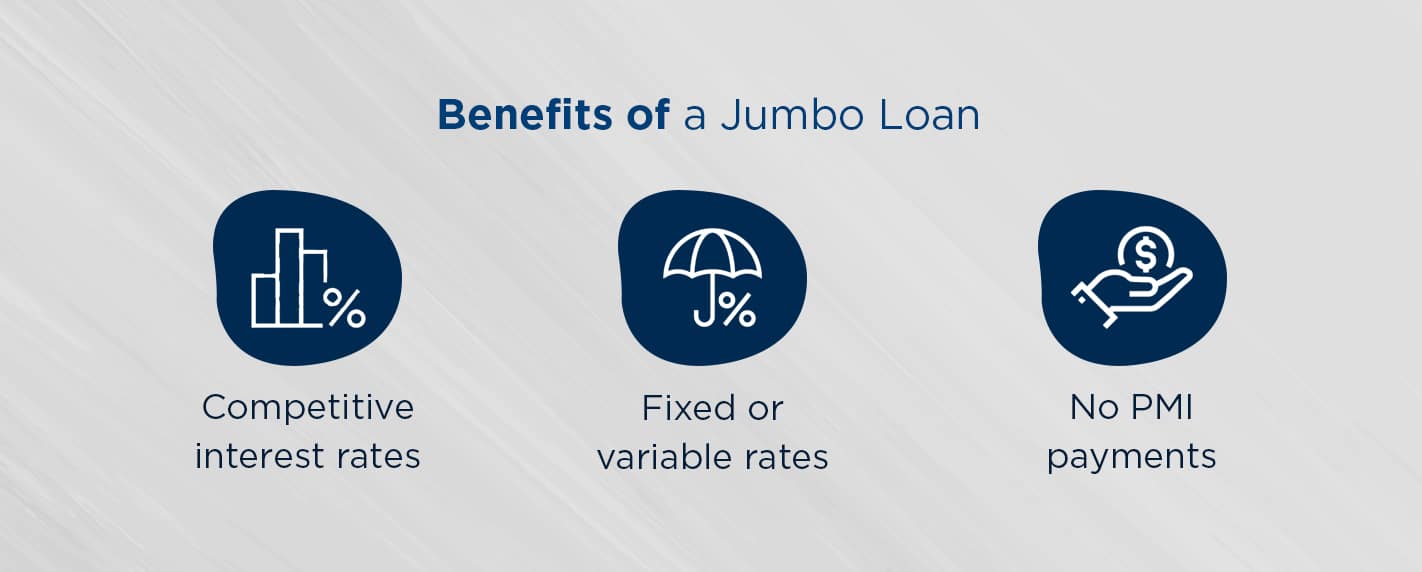Comprehending Jumbo Loan: What You Need to Know for Deluxe Home Purchases
Comprehending Jumbo Loan: What You Need to Know for Deluxe Home Purchases
Blog Article
The Effect of Jumbo Car Loans on Your Financing Alternatives: What You Need to Know Before Using
Jumbo fundings can play an essential function in shaping your funding alternatives, specifically when it comes to obtaining high-value properties. Recognizing the equilibrium between the difficulties and advantages posed by these car loans is necessary for prospective consumers.
Comprehending Jumbo Car Loans
Understanding Jumbo Loans calls for a clear grasp of their one-of-a-kind attributes and requirements. Big loans are a kind of home mortgage that surpasses the conforming finance limitations developed by the Federal Housing Money Agency (FHFA) These restrictions vary by area but commonly cap at $647,200 in many locations, making big financings vital for funding higher-priced buildings.
One of the specifying functions of jumbo financings is that they are not eligible for purchase by Fannie Mae or Freddie Mac, which leads to more stringent underwriting standards. Consumers must typically demonstrate a higher credit rating rating, commonly above 700, and give considerable documentation of revenue and properties. Furthermore, lending institutions may require a larger deposit-- frequently 20% or more-- to alleviate threat.
Rate of interest on jumbo financings can be slightly more than those for adhering finances as a result of the increased risk assumed by the loan provider. The lack of exclusive home mortgage insurance policy (PMI) can offset some of these costs. Comprehending these aspects is critical for potential customers, as they considerably affect the terms and usefulness of securing a big car loan in today's affordable genuine estate market.
Benefits of Jumbo Finances
Jumbo loans offer distinctive benefits for property buyers seeking to purchase high-value properties that go beyond traditional finance limitations. One of the primary benefits of jumbo lendings is their capacity to fund larger amounts, permitting customers to obtain homes in premium markets without the restrictions imposed by adjusting financing limitations - jumbo loan. This versatility makes it possible for buyers to see a wider series of residential properties that might better suit their demands and preferences
Furthermore, jumbo finances typically come with affordable rate of interest rates, especially for debtors with strong credit history profiles. This can lead to significant cost savings over the life of the loan, making homeownership a lot more cost effective in the long run. In addition, big fundings can be tailored to suit private economic situations, supplying various terms and amortization choices that straighten with the borrower's goals.

Challenges of Jumbo Loans
Browsing the intricacies of jumbo lendings presents numerous difficulties that prospective customers should understand prior to proceeding. One substantial difficulty is the rigorous borrowing requirements imposed by monetary organizations. Unlike adhering finances, jumbo lendings are not backed by government-sponsored enterprises, leading lenders to adopt even more extensive requirements. This frequently includes higher credit report requirements and substantial paperwork to verify revenue and assets (jumbo loan).
In addition, big financings normally include higher rate of interest compared to standard financings. This elevated expense can dramatically influence month-to-month settlements and general price, making it essential for consumers to very carefully my explanation evaluate their economic situation. The down settlement demands for big finances can be significant, usually varying from 10% to 20% or even more, which can be a barrier for numerous prospective homeowners.
An additional challenge lies in the minimal availability of jumbo finance products, as not all lenders use them. This can bring about a reduced pool of choices, making it critical for customers to carry out detailed research and potentially seek specialized loan providers. On the whole, understanding these challenges is important for any individual taking into consideration a big lending, as it guarantees educated decision-making and far better financial planning.
Certification Standards
For those considering a jumbo funding, fulfilling the credentials requirements is an essential step in the application process. Unlike conventional lendings, jumbo fundings are not backed by federal government agencies, resulting in more stringent needs.
Firstly, a strong credit report score is important; most lending institutions need a minimum rating of 700. Additionally, debtors are usually anticipated to demonstrate a substantial earnings to guarantee they can easily manage greater monthly repayments.
Down payment demands for jumbo finances are also substantial. Borrowers must anticipate taking down at the very least 20% of the building's purchase cost, although some lending institutions might provide options as reduced as 10%. Showing cash books is critical; lenders typically call for evidence of sufficient liquid assets to cover a number of months' well worth of home mortgage payments.
Comparing Financing Choices
When examining funding alternatives for high-value buildings, understanding the differences between different financing kinds is important. Jumbo fundings, which go beyond adjusting lending limits, usually included more stringent certifications and greater rates of interest than standard financings. These loans are not backed by government-sponsored enterprises, which increases the lender's risk and can lead to a lot more strict underwriting requirements.
On the other hand, standard financings provide even more versatility and are commonly simpler to acquire for debtors with strong credit history profiles. They might feature lower rates of interest and a bigger variety of choices, such as repaired or variable-rate mortgages. Additionally, government-backed loans, like FHA or VA financings, supply chances for reduced down settlements and more forgiving debt demands, though they also enforce limitations on the loan quantities.

Final Thought
To conclude, big financings existing both possibilities and obstacles for prospective homebuyers seeking funding for high-value residential or commercial properties. While these fundings enable bigger amounts without the concern of Our site personal home loan insurance coverage, they include strict certification requirements and potential drawbacks such as greater passion prices. A detailed understanding of the advantages and difficulties associated you could try here with big finances is crucial for making educated decisions that align with long-term economic objectives and goals in the realty market.

Report this page